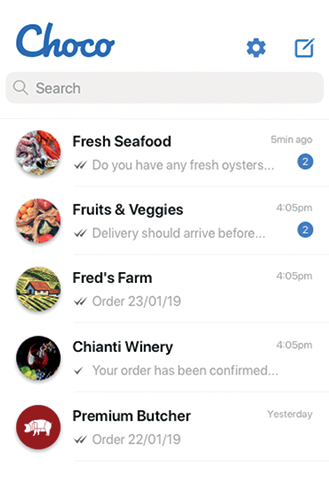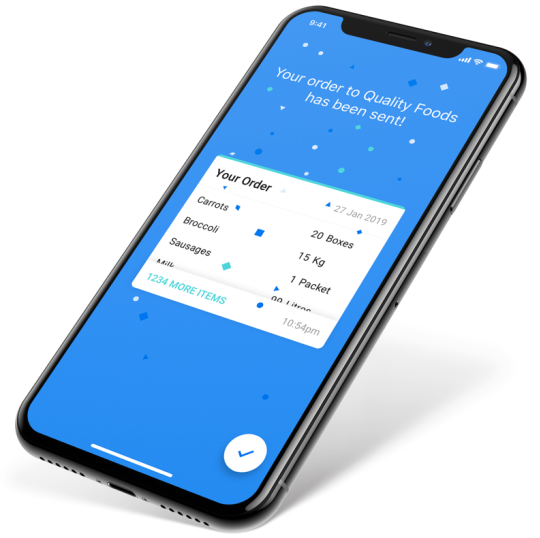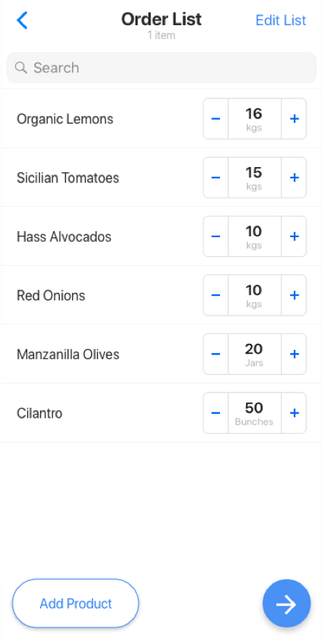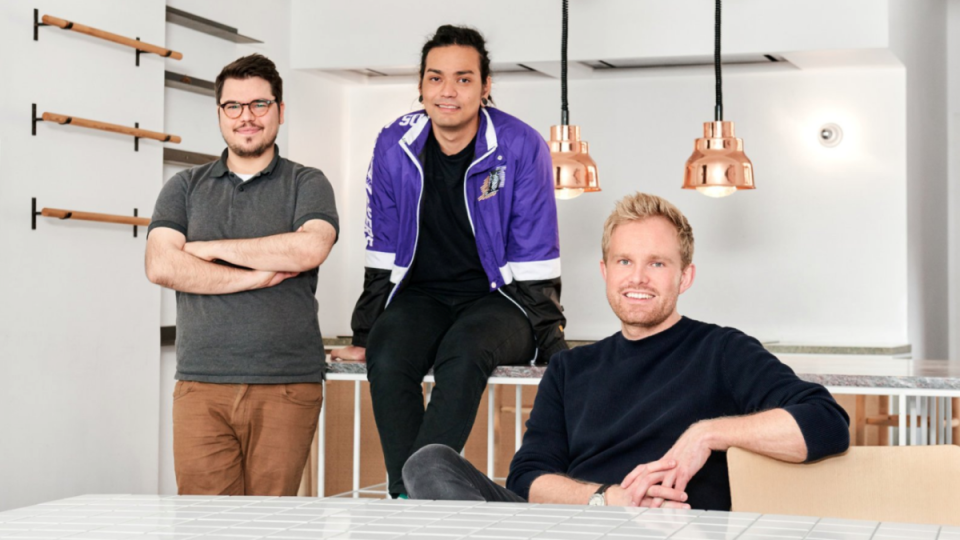Choco, a company that’s setting out to digitalize the global food system with a platform that connects restaurants with the supply chain, has raised $30.2 Million in a round of funding led by New York-based hedge fund Coatue Management.
Founded out of Berlin in 2018, Choco meshes mobile commerce and messaging into a single platform to help restaurant owners and food suppliers take all their orders and communications online. Choco works with some 10,000 wholesalers and producers globally, helping them to create product catalogs to upload to Choco’s platform. Suppliers can elect to receive orders via an online dashboard, email, text, or fax — this hints at the old-school ways still employed by many across the industry. The Choco platform helps suppliers make things easier for their buyers to place orders, while enabling suppliers to stick with their existing internal workflows.
“The main objective for Choco is to provide value to suppliers and restaurants while integrating into their workflow as seamlessly as possible,” Choco founder and CEO Daniel Khachab told VentureBeat. “While we offer our own proprietary web and app tool for suppliers to receive orders on and restaurants to send orders on, if they are not yet ready to make this change because of their existing workflow, we have this option also.”

Above: Choco CEO and founder Daniel Khachab,
Communications across the industry is very “non-cohesive,” according to Khachab, with suppliers often having to monitor phone lines, text messages, and fax machines to ensure no orders or amendments are missed. “This is often time- and labor-consuming and leads to mistakes, through misheard voicemails and mis-typed messages,” he said. “Our online system stores product codes and units, effectively eliminating these mistakes, allowing supplier representatives to focus on good service rather than dealing with errors.”

Above: Choco app with messaging functionality
Choco is currently operational in nine countries, including the U.S., Germany, France, Spain, Brazil, and Singapore. The company has now raised more than $70 million since its inception, and with its latest investment — which included participation from Bessemer Venture Partners, Atlantic Labs, Target Global, Base10, and Greyhound — it’s now well financed to expand into new markets and double its team to more than 200 employees by the end of 2020.
Streamlined
The National Restaurant Association projects that the U.S. restaurant industry alone will be a $1.2 trillion market by 2030, up from $833 billion in 2018. However, the sector is already seeing significant disruptions across the spectrum, including the rise of delivery-only “cloud kitchens” powered by burgeoning on-demand delivery networks. Various platforms have also emerged to help brick-and-mortar eateries transition to online ordering. Regardless of what the restaurant industry looks a decade from now, one thing that likely won’t change is the need for restaurants to procure high-quality produce from suppliers both at home and abroad.
Choco offers restaurants a mobile app through which they can find and purchase produce. The idea here is that rather than having to pick up a phone to contact 10-15 suppliers, which is time-consuming and leaves no record of the order ever having been placed, they can instead place their orders from multiple suppliers through a single app. Automatic notifications, alerts, and confirmations are very much part of the promise here.

Above: Choco: Order confirmation
This also removes any ambiguities or confusion from the order process, because when they place an order from a menu-style interface they are requesting a very specific product type, which isn’t open to interpretation. In theory, this negates the need to return goods, which may subsequently end up in a landfill. Roughly one-third of food produced globally each year never meets a human mouth, according to the United Nations’ Food and Agriculture Organization (FAO). This effectively means that $1 trillion worth of perfectly edible food goes uneaten.
“To combat this in a way that seamlessly integrates with the workflow of restaurants and suppliers, the Choco app is made tailored to each restaurant,” Khachab said. “We digitalize the order guides, or the products the restaurant usually orders, including units and product ID numbers, and connect these with the exact suppliers they usually order from. This actually reduces the number of ‘second runs’ by up to 90%, and makes ordering three times faster.”

Above: Ordering through Choco
Choco’s latest cash injection comes just six months after its previous $33.5 million raise, which suggests that investors see huge potential in technologies that are setting out to improve the food supply chain. A number of other companies are working toward this end too, including Full Harvest which is a B2B marketplace that helps farmers offload surplus and imperfect produce to food and beverage companies — it raised $8.5 million back in 2018. And a few months back, Green Rabbit closed a $31 million investment to automate the food distribution, fulfillment, and delivery processes.
It is worth noting, though, that Choco isn’t yet making money — its platform is free to use for both restaurants and suppliers. For now, the focus is on gaining traction then worrying about its business model further down the road. The company does have some idea of how it will make money though, and this will include optional premium features that will “capitalize on supply chain inefficiencies,” according to Khachab. Examples of this include food-waste tracking smarts, inventory management, predictive analytics, truck routing, and more.
“These will target, and be designed for, three distinct user groups — producers, distributors and restaurants,” Khachab said. “Our current non-paid offering is just the start.”
The pandemic effect
The COVID-19 crisis has hit many sectors badly, and with consumers forced into lockdown the restaurant industry has been adversely affected. However, many kitchens are still able to dispatch food, with tech giants such as Uber and Lyft redistributing their driver resources to address the shift in demand from ride-hailing to deliveries. Furthermore, the current predicament is likely a temporary artifact, and once the COVID-19 pandemic passes the world will should return to some semblance of normalcy.
“On the consumer side people will start coming back to restaurants,” Khachab said. “It’s about the social experience, the social gathering, and about experiencing this real form of art produced by chefs with so much passion. Food is also one of the most important and beautiful ways to perceive and communicate culture. Not to mention the demand for convenient, varied, and professionally prepared food in the working world will undoubtedly return.”
Choco is also following a trend that has seen many of the big technology companies pivot their businesses to cater to the present “normal”. With another $30.2 million in the bank, the company is now launching a direct-to-consumer business, enabling suppliers to funnel their excess supplies directly to end-users, addressing an ongoing issue that has seen panic-buying resulting in empty grocery store shelves. Indeed, the problem here isn’t that there is less food available overall, it’s that the supply chain has struggled to adapt to the huge spike in food buying. Choco is targeting suppliers near the epicenters of the coronavirus crisis, including New York and Paris, helping them to assemble digital shopfronts overnight.
On the restaurants side, Choco has also said that it is helping them set up mobile ordering and delivery operations, aimed specifically at smaller, family-owned and local restaurants.
“This was a pure reaction to the demands of the market,” Khachab said. “We were seeing supermarket shelves empty while our partner suppliers such as Krystal Fruits and Vegetables in New York were left with $800,000 in unsold produce. This would all have been wasted, and Mike [Longo, Kyrstal owner] was ready to fire most of his staff. After this web store launched, he has seen a 131% growth in his B2C customer base from zero, and is now looking to hire more staff.”
Khachab also said that it is committing 100% of the profits from this initiative directly to local restaurant charities in each city it operates in.
“We are at a time of global crisis where our industry needs the help — and the digital tools — to keep businesses running,” Khachab continued.



